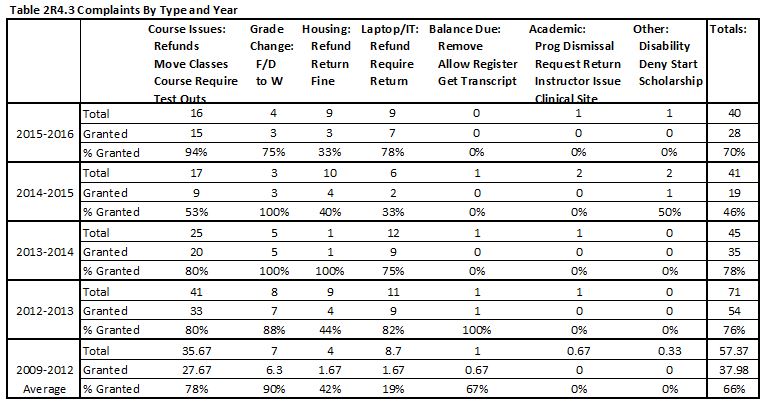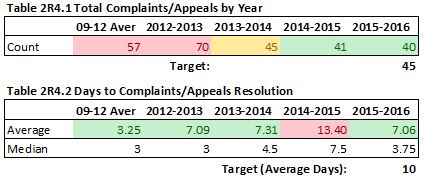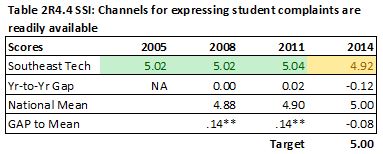2R4 Complaint Processes Results
What are the results for student and key stakeholder complaints? This includes, but is not limited to, descriptions of the following:
• Summary results of measures (include tables and figures when possible)
• Comparison of results with internal targets and external benchmarks
• Interpretation of results and insights gained
Summary Results of Measures AND Comparison of Results with Internal Targets AND Interpretation of Results and Insights Gained 
Southeast Tech’s total number of formal complaints/appeals has dropped by 30% (57 to 40) from the 2009-2012 average to the 2015-2016 count (Table 2R4.1). That reduction has occurred because of specific efforts the Institute took to reduce complaints/appeals in specific areas. As shown in the Complaints by Type and Year (Table 2R4.3), refunds on courses and laptops were two key student complaint/appeal areas. Southeast Tech set out to reduce these refund concerns by: 1. developing processes to determine student enrollment status faster, assuring that students who left the Institute were removed from courses and received their appropriate refunds prior to the need for an appeal, and 2. developing processes to allow students to bring their own laptop (rather than purchasing one through Southeast Tech), again resulting in fewer appeals. (The uptick in 2015-2016 in this category is due to part-time student requests to have the laptop requirement delayed until they enter the program as full-time students.) Although the percentage of complaints/appeals that have been granted dipped to 46% in 2014-2015, it is now back up to a level similar to previous years (70% for 2015-2016). The Institute believes that this may continue at this level in the future. The Institute also believes this rate is an indication that the processes and communications that have been put in place are successfully addressing student concerns/appeals ahead of time; therefore, the remaining complaints/appeals are justifiable complaints/appeals that do need to rise to, and be addressed, at a higher level.
Timely responses to complaints/appeals is an additional measure of the success of the Institute’s complaints/appeals process (Table 2R4.2). However, the data shows an increase rather than a decrease in the days to resolution (3.25 average for 2009-2012 to a peak of 13.40 days in 2014-2015 and 7.06 days in 2015-2016). While this trend may at first appear negative, part of the reason for the increase is that the Institute has been able to “fix” many of the simpler complaint/appeal issues before a complaint/appeal is necessary, reducing the number of quick responses and leaving more of the longer responses. In the analysis of the 2014-2015 data, Southeast Tech found that a couple of more complicated complaints/appeals skewed the average. Over the years, the median number of days, however, has remained fairly consistent with the 2014-2015 year slightly elevated. The Institute will continue to monitor both measures but will leave the target level at an average of 10 or fewer days-to-resolution, expecting that as the Institute designs its processes to solve complaints/appeals before they occur, the remaining complaints/appeals will likely take longer to resolve.
Comparison of Results with External Benchmarks AND Interpretation of Results and Insights Gained
Through the use of the Noel-Levitz Student Satisfaction Inventory, Southeast Tech tracks student satisfaction of its complaint  process. Based on the highest National Mean for the years the Institute has given the SSI survey, the Institute has scored statistically above the mean three out of the last four survey years. Although the most recent year was below the mean, the difference was only .08, which was not statistically different from the National Mean. Southeast Tech is pleased with these results; however, the Institute has set its target level at 5.00 and is continuing to work toward meeting that goal consistently. Therefore, in 2016-2017, Southeast Tech created a Decision Board. The Decision Board provides the Institute’s Student Government Association (SGA) with a mechanism to take student ideas, concerns, and complaints to a board of faculty, staff, administrators, and students to discuss the request and determine a course of action. The system has been designed to assure that SGA receives a response on its request and that actions can be taken faster and more efficiently as needed. The next survey results will be available in summer 2017 and will be analyzed by the Student Success Team for further action. process. Based on the highest National Mean for the years the Institute has given the SSI survey, the Institute has scored statistically above the mean three out of the last four survey years. Although the most recent year was below the mean, the difference was only .08, which was not statistically different from the National Mean. Southeast Tech is pleased with these results; however, the Institute has set its target level at 5.00 and is continuing to work toward meeting that goal consistently. Therefore, in 2016-2017, Southeast Tech created a Decision Board. The Decision Board provides the Institute’s Student Government Association (SGA) with a mechanism to take student ideas, concerns, and complaints to a board of faculty, staff, administrators, and students to discuss the request and determine a course of action. The system has been designed to assure that SGA receives a response on its request and that actions can be taken faster and more efficiently as needed. The next survey results will be available in summer 2017 and will be analyzed by the Student Success Team for further action.
Add to Catalog Bookmarks (opens a new window)
|